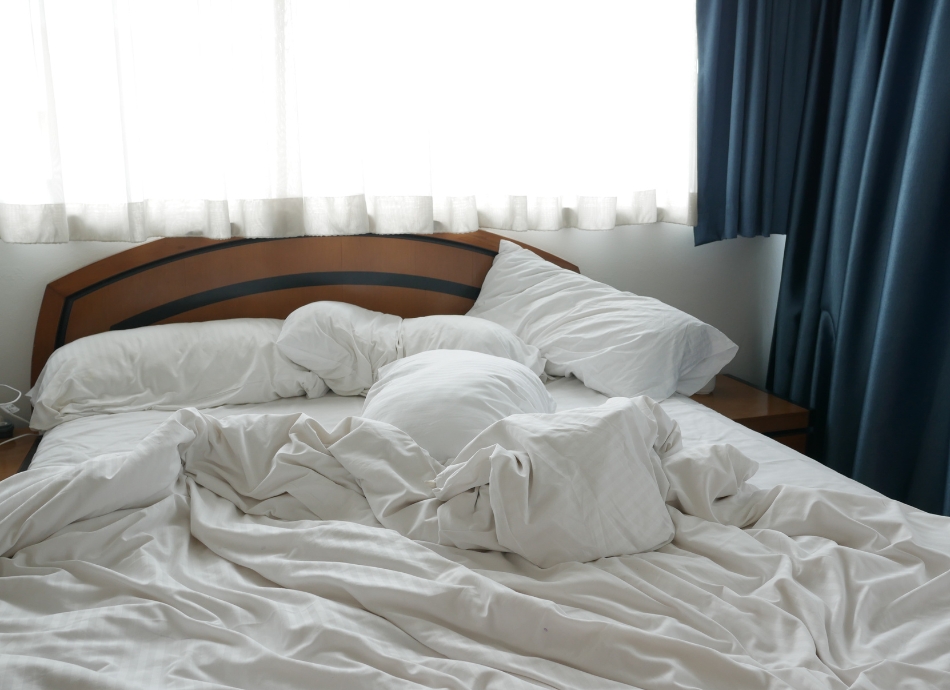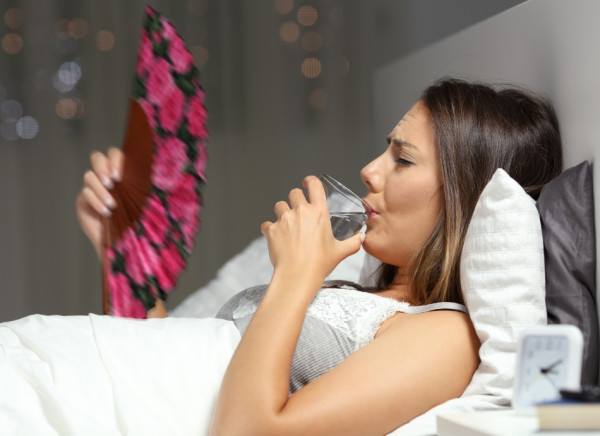You can now add Healthify as a preferred source on Google. Click here to see us when you search Google.
Night sweats
Key points about night sweats
- Night sweats are frequent bouts of excessive sweating at night that lead to soaking of your bedclothes and bedding and disturb your sleep. This occurs even when your bedroom or bedding isn't hot.
- Night sweats can affect people of any age or gender.
- Night sweats are more common in women due to hormonal changes. Other causes include underlying medical conditions or certain medicines.
- See your healthcare provider if you have night sweats, especially if you have symptoms of fever, weight loss, cough, localized pain or diarrhoea.

Sweating is a normal response of your body to heat when your core body temperature rises. Evaporation of water from your skin during sweating cools the body and regulates your body temperature.
Anyone can get hot and sweaty at night if your room is too warm or there are too many blankets on. While this is uncomfortable, it’s not thought of as night sweats. Night sweats are when you sweat so much at night that your clothes or bed sheets are soaking wet – even in a cool room.
Some health conditions and medicines can cause night sweats, but sometimes the cause is unknown.
Night sweats are common in women during times of changing hormone (oestrogen) levels. The hypothalamus (part of the brain that regulates body heat) is affected by fluctuating hormone levels.
The most common causes linked to hormonal changes in women are:
- menopause (when periods have stopped for 12 months)
- perimenopause (the time leading up to menopause)
- premenstrual syndrome (PMS)
- pregnancy and just after giving birth.
Other causes of night sweats include:
- infections, eg, COVID-19, flu, tuberculosis, HIV, infection of heart valves (infective endocarditis), or bones (osteomyelitis), and other infections
- cancer (eg, leukaemia, non-Hodgkins lymphoma and other cancers)
- overactive thyroid (hyperthyroidism)
- low blood glucose (hypoglycaemia)
- endocrine tumours, eg, pheochromocytoma
- low testosterone in men
- neurological problems, eg, stroke, autonomic dysreflexia, autonomic neuropathy
- gastro-oesophageal acid reflux
- sleep disorders, eg, obstructive sleep apnoea
- stress and anxiety
- substance use and withdrawal (including alcohol)
- hyperhidrosis – a harmless condition that makes you sweat excessively, usually during the daytime.
Medicines that cause night sweats might include:
- antidepressants
- diabetes medicines that cause low blood glucose
- high blood pressure medicines
- hormone therapy
- methadone (used to treat opioid dependency)
- some cancer treatments
- some painkillers and steroid medicines.
If you’re regularly having night sweats it may mean you’re not getting enough sleep. This can lead to weight gain and health problems (eg, diabetes, high blood pressure, depression). It can also lead to problems during the day including:
- sleepiness
- loss of concentration and memory issues
- car accidents
- low level of productivity and safety at work.
You should see your healthcare provider if your night sweats:
- are severe
- interfere with your sleep
- affect the quality of your life
- are associated with other symptoms.
Symptoms that may indicate you have a specific cause for your night sweats include:
- unexplained weight loss
- fever (high temperature)
- pain in a specific area
- a cough
- diarrhoea (runny poo).
Talk to your healthcare provider about how long you've been having night sweats, how bad or intense they are and how often they happen. Also tell them if you have any other symptoms.
Your healthcare provider will ask you questions, examine you and possibly do tests to work out what might be causing them.
Any treatment will depend on what’s causing the night sweats. If there's an underlying health condition your healthcare provider will address that.
If your night sweats are related to menopause, your healthcare provider might recommend menopausal hormone therapy (MHT).
If you’re taking medicine that’s causing night sweats, there might be another option you can try.
Depending on what’s causing your night sweats, here are some tips to make you feel more comfortable during the night:
- Wear loose fitting nightwear made of natural fibres, eg, linen and cotton.
- Avoid heavy blankets and bedding.
- Keep your bedroom cool and keep the air moving by opening a window, using a fan or keeping air conditioning on.
- Keep a glass of cold water by the bed.

Image credit: Canva
It might also help to:
- avoid eating heavy meals 2 to 3 hours before bed
- exercise regularly, but not right before bed
- avoid spicy food, caffeine and alcohol before bed
- eat a healthy diet that’s lower in sugar and fat
- use relaxation techniques before bedtime.
Apps reviewed by Healthify
You may find it useful to look at some Mental health and wellbeing apps and Sleep apps.
What to know about night sweats(external link) Medical News Today
Night sweats(external link) Mayo Clinic, US
Apps
Mental health and wellbeing apps
Sleep apps
References
- Night sweats(external link) NHS, UK, 2023
- Night sweats(external link) Health Direct Australia, 2023
- Night sweats(external link) Mayo Clinic, US, 2022
- Health risks of poor sleep(external link) Johns Hopkins Medicine, US
- Larnard J, Berry J, Majety P, et al. Patients who report night sweats(external link) BMJ 2023;381:e073982
- Bryce C. Persistent night sweats – diagnostic evaluation(external link) Am Fam Physician 2020;102(7):427-433
Credits: Healthify editorial team. Healthify is brought to you by Health Navigator Charitable Trust.
Reviewed by: Dr Poornima Nair, GP, Hamilton
Last reviewed:





